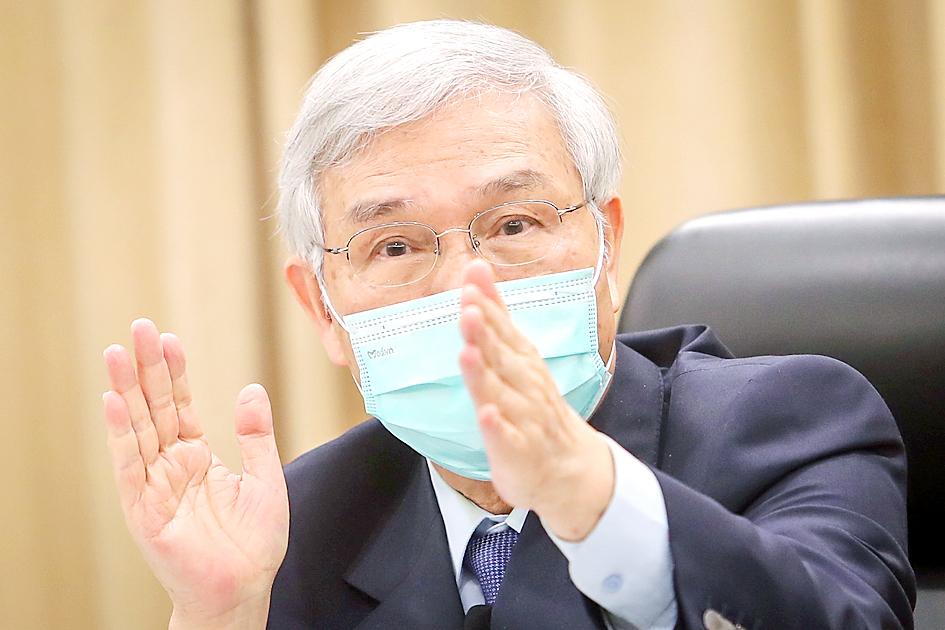The central bank yesterday tightened credit controls for second-home mortgages in specific areas and purchases of plots of land, especially in industrial parks.
However, the nation’s top monetary policymaker kept its policy rate at a record-low 1.125 percent for the sixth consecutive quarter, despite revising up its GDP growth forecast for this year from 5.08 percent to 5.75 percent.
“Board members factored in economic uncertainty at home and around the world,” central bank Governor Yang Chin-long (楊金龍) said, adding that growing inflationary pressure was a temporary phenomenon induced by bad weather and a low base effect for oil prices.

Photo: CNA
International fuel price increases underpinned higher consumer prices in Taiwan this quarter, but the trend would stabilize next quarter, Yang said, adding that consumer prices remained stable after excluding volatile energy costs.
The central bank predicted that consumer prices would expand by a mild 1.7 percent this year, based on which it decided to continue its loose monetary policy, in line with central banks in the US and other advanced nations.
Although Taiwan’s economy has outperformed its peers so far this year, the growth pace is expected to slow in the second half of the year, Yang said, adding that the central bank expects a moderate growth of 3.45 percent next year.
The economy is not overheating, Yang said, adding that unemployment rates remain relatively high due to measures to curb the spread of COVID-19 imposed after an outbreak in May.
Subdued consumer activity and lingering uncertainty amid the COVID-19 pandemic and other risks warrant a stable policy, he added.
Yang said that the central bank’s board meeting passed new credit controls after two previous efforts failed to rein in mortgage and land financing.
Starting today, the central bank bars lenders from granting grace periods to second-home purchases in Taipei, New Taipei City, Taoyuan, Taichung, Tainan, Kaohsiung, Hsinchu County and Hsinchu City, he said.
“The mild adjustment is not intended to curb property price increases, but aims to prevent overleveraging on the part of multiple home owners,” Yang said.
The six special municipalities and Hsinchu city and county account for 82.6 percent of the nation’s mortgage deals, Yang said.
Further, the central bank would lower the loan to value ratio for land financing from 65 percent to 60 percent and cut the ratio for plots in industrial parks from 55 percent to 50 percent, Yang said.
In addition, it would limit the period in which a new owner must start working on their plot in an industrial park to one year, to avoid land hoarding, Yang said.
Land hoarding leads to property price increases, which has become evident in the past few years amid onshoring and a supply chain realignment trend, Yang said.

TAKING STOCK: A Taiwanese cookware firm in Vietnam urged customers to assess inventory or place orders early so shipments can reach the US while tariffs are paused Taiwanese businesses in Vietnam are exploring alternatives after the White House imposed a 46 percent import duty on Vietnamese goods, following US President Donald Trump’s announcement of “reciprocal” tariffs on the US’ trading partners. Lo Shih-liang (羅世良), chairman of Brico Industry Co (裕茂工業), a Taiwanese company that manufactures cast iron cookware and stove components in Vietnam, said that more than 40 percent of his business was tied to the US market, describing the constant US policy shifts as an emotional roller coaster. “I work during the day and stay up all night watching the news. I’ve been following US news until 3am

UNCERTAINTY: Innolux activated a stringent supply chain management mechanism, as it did during the COVID-19 pandemic, to ensure optimal inventory levels for customers Flat-panel display makers AUO Corp (友達) and Innolux Corp (群創) yesterday said that about 12 to 20 percent of their display business is at risk of potential US tariffs and that they would relocate production or shipment destinations to mitigate the levies’ effects. US tariffs would have a direct impact of US$200 million on AUO’s revenue, company chairman Paul Peng (彭雙浪) told reporters on the sidelines of the Touch Taiwan trade show in Taipei yesterday. That would make up about 12 percent of the company’s overall revenue. To cope with the tariff uncertainty, AUO plans to allocate its production to manufacturing facilities in

Six years ago, LVMH’s billionaire CEO Bernard Arnault and US President Donald Trump cut the blue ribbon on a factory in rural Texas that would make designer handbags for Louis Vuitton, one of the world’s best-known luxury brands. However, since the high-profile opening, the factory has faced a host of problems limiting production, 11 former Louis Vuitton employees said. The site has consistently ranked among the worst-performing for Louis Vuitton globally, “significantly” underperforming other facilities, said three former Louis Vuitton workers and a senior industry source, who cited internal rankings shared with staff. The plant’s problems — which have not

COLLABORATION: Given Taiwan’s key position in global supply chains, the US firm is discussing strategies with local partners and clients to deal with global uncertainties Advanced Micro Devices Inc (AMD) yesterday said it is meeting with local ecosystem partners, including Taiwan Semiconductor Manufacturing Co (TSMC, 台積電), to discuss strategies, including long-term manufacturing, to navigate uncertainties such as US tariffs, as Taiwan occupies an important position in global supply chains. AMD chief executive officer Lisa Su (蘇姿丰) told reporters that Taiwan is an important part of the chip designer’s ecosystem and she is discussing with partners and customers in Taiwan to forge strong collaborations on different areas during this critical period. AMD has just become the first artificial-intelligence (AI) server chip customer of TSMC to utilize its advanced